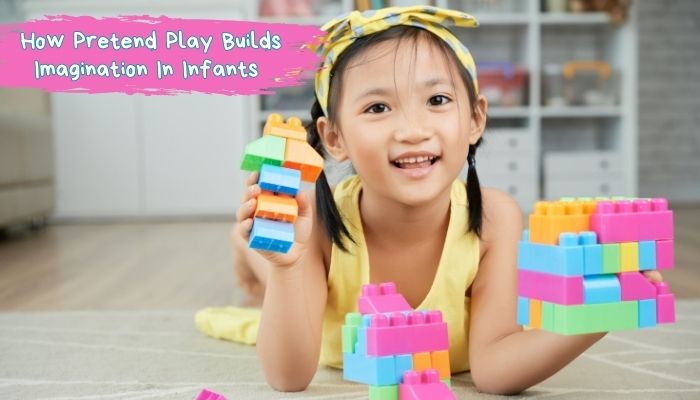A child picking up a stone or a small Lego and pretending it to be a zooming car is a common sight. The tiny imaginative minds make use of any object, imagine it as something, and play with it. This is a common sight at home and at any Child Care Centre in Singapore. This pretend play is more complex than it looks. It helps build skills in many essential developmental areas.
This blog explains the importance of pretend play and how it helps with overall child development.
What is a pretend play?
Pretend play, also known as dramatic play or fantasy play, is where children use their imagination to play different made-up roles. It covers a wide range of activities in which the children can participate. Further, such activities help with cognitive development. Children tend to explore endless possibilities, mainly because of their imagination.
Pretend play is a fun way for your child to connect with the outside world and the people in it. This play format opens an inspired space and brings their imagination to life. They not only socialize but also strengthen their language development and cultivate key life skills.
Children start to imagine at an early age. With age, their imagination becomes more creative and bigger. This format of play-based learning provides them a chance to actualize things that they learn in classrooms at any preschool in SG.
Why is pretend play important?
Experts believe that pretend play is key to overall child development. It helps children learn and understand all the things they interact with. Further, it fosters a child’s creativity and curiosity.
It also provides the tiny minds with the tools they need to lay the foundation for language, cognitive, social, emotional, and self-regulation skills. These foundational skills play a key role in the child’s psychological development and well-being. This format of play works as a perfect setting for the child to thrive and excel, thus boosting the child’s confidence.
Benefits of pretend play
Imaginative play provides children with many benefits, some of which include
Encourages imagination and creativity
Pretend play boosts cognitive ability linked to creativity. A child uses their creativity and imagine things, in the role play. It helps in the long run and as the child grows and faces the world.
Supports social and emotional development
During imaginative play, children develop emotional and social roles. The child steps into someone else’s shoes and looks at the world from their perspective. It helps the child develop empathy and learn to cooperate with their peers.
Improves language skills
Imaginative play provides children with a chance to experiment with language. Children express their views, put their points across, and explain their feelings while they enjoy their playtime.
Encourages self-expression
A daycare center provides them with ample chances to speak in public and express their opinions. This will boost their confidence and help them in the long run.
How do you encourage pretend play?
Professional care providers believe that pretend play is one of the easiest activities that engages the child for a long time. Children are curious and creative; they tend to explore and learn in a fun manner. The safe and healthy space allows them to experiment with new roles and gain confidence.
When they are a few months old, primary care providers (mothers or infant care teachers) can perform normal day-to-day actions, which the infant can replicate. In a few months, one can notice that the toddlers tend to replicate their mothers or the primary care provider. Actions like chatting with infants, singing songs, and playing with toys can be a great start for this play format.
The child tends to grow and attend childcare programs, they start to notice everything and everyone around them. They try to replicate people or items, which gather their interest.
As a parent or primary care provider, one can reverse roles with the little one. Children can be encouraged to replicate their superheroes or any other helpers in society.
Providing the child with a dedicated space to play will encourage them to imagine and explore their ideas. Thus, providing them the best chance to enhance their skills. Hence, a preschool can provide them with the best settings for them to learn new roles.




